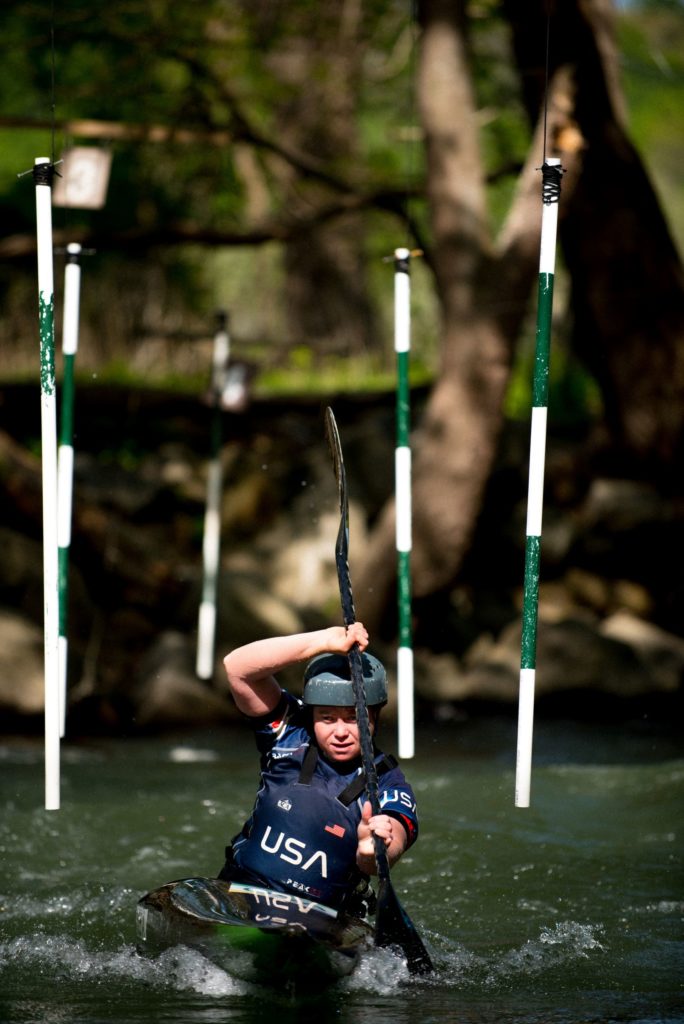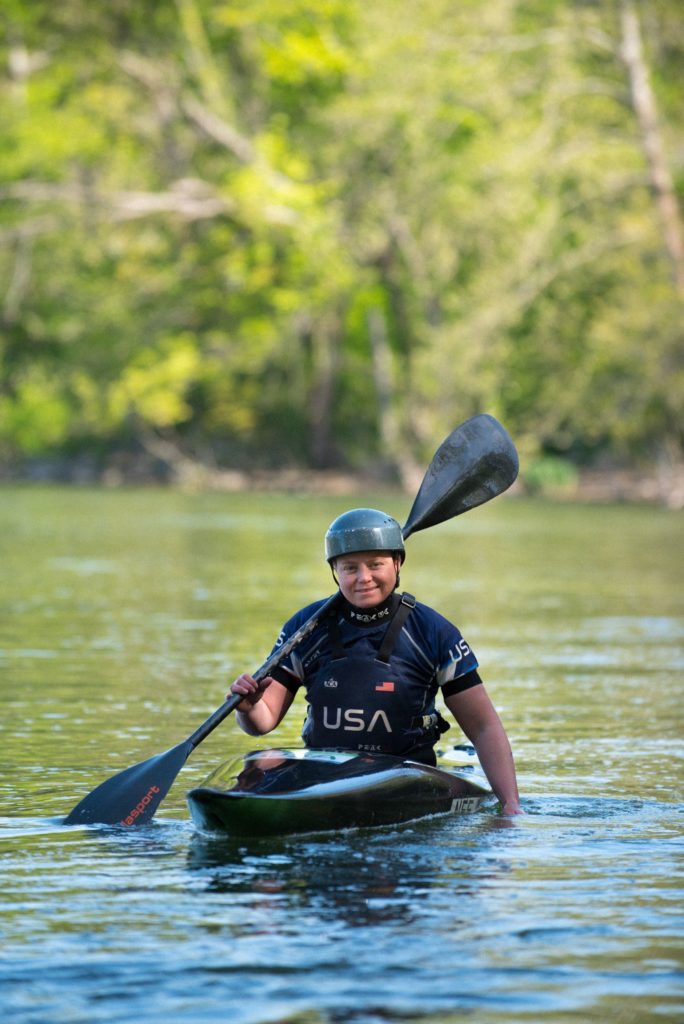
At 10, Ashley Nee was excited about going to Valley Mill summer camp. She had heard great things about the athletic oasis in Darnestown, and Mallory, her BFF, was also going.
Valley Mill’s shimmering two-acre lake has produced many excellent paddlers. Mallory was keen for kayaking, but Ashley was content to get in a canoe “and float around doing nothing.” Not to be denied, Mallory cajoled their teenage instructor into teaching them how to kayak “right now.”
Safety comes first so the girls were taught how to right themselves if their kayak flips upside down, using a so-called Eskimo roll — a Shakira-shake of the hips and a paddle thrust. “Apparently I did that fairly well,” Nee, now 32, recalls, “because what felt like the next day, I was training with an Olympic-caliber coach that I trained with for seven years.”
Nee soon became the classic river rat. She couldn’t wait to get on the water. All because her friend Mallory would only take yes for an answer.
This was before Nee became a world-class Olympic competitor in an international sport governed by federations, known by acronyms, that can determine the direction of an elite athlete’s career. This was before the sport’s governing bodies turned Nee’s kayaking life upside down so that no amount of hip or lip shaking could get her back on course.
Unless there’s a new eligibility ruling by the International Olympic Committee (IOC), the International Canoe Federation (ICF) and the Pan American Canoe Federation (COPAC), Nee will not be paddling when the Tokyo Olympics opens on July 23. “I’m pretty much done with trying to make Tokyo,” she says. “It was not a good process for me personally — it took away the love of the sport for me — a hard thing to do when I’ve been doing this for two-thirds of my life.”
As good as Nee has been in the water, she has had more than her share of heartbreak when not paddling. Everyone who knows her, however, expects to see her back at the Olympics.

Last summer, Nee was paddling on Pennsylvania’s Youghiogheny River with her good friend Lane Kurkjian, a hobby kayaker who admits to being a bit nervous on the water. Kurkjian flipped going through a modest rapid and tried three times to roll upright, and eventually had to swim out of the boat. Nee paddled to her obviously frustrated and upset friend, offered some comforting words and then corrected her technique.
“She read my stress level and she fixed my problem — all within five minutes and it was really lovely,” Kurkjian says.
You find out quickly that Ashley Nee is a different fish out of the water. On dry land, friends say, she can be bubbly, playful and almost goofy. In the boat “she’s hyper-focused, serious and intense,” says Devin McEwan, a training partner and fellow Olympian.
“Ashley is the most intense with herself,” adds Kurkjian.
Ian Brown, 20, a sophomore at Virginia Tech and an accomplished paddler, says Nee “was a good coach and fun to paddle with and I actually learned a ton about slalom, even though I was instructing alongside her [at Valley Mill].”
Nee grew up in Darnestown and went to Northwest High School. Her first sport crush was gymnastics. She idolized Dominique Dawes and vividly remembered staring at the Olympic star intently while training at Hills Gymnastics in Gaithersburg. (Nee’s mom keeps Dawes’ autograph in her jewelry box.)
Nee started racing when she was 12 and performed so well that she qualified for the 2008 Beijing Olympics at age 17 but dislocated her shoulder and couldn’t compete.
Disheartened, she moved to Hawaii and began studying kinesiology at the University of Hawaii. “I needed time away from the sport because I didn’t feel very supported and that was very hard. So I took time away to try to learn who I am and what’s important to me,” she says.
A relationship with Ashley McEwan, another paddler and teacher she knew from camp, blossomed into marriage. McEwan — they are now divorced — eventually convinced Nee that kayaking was too integral to her life to give it up. In 2012, Nee came home, transferred her college credits to the University of Maryland and began training with a protégé. In a twist as old as time, the protégé narrowly beat out her teacher to claim a berth at the 2012 London Olympics. Nee later told The Diamondback it felt “like knives
in the stomach.”
Yet a day later, she got back to work training for the Rio de Janeiro Olympics in 2016. She won a bronze medal in kayak singles at the 2015 Pan American Games but had a disappointing showing in Rio, finishing 14th. Nee says Tokyo was already in her head when she crossed the finish line.
Nee performed well enough in competition to be eligible for a 2020 slot in Tokyo. Enter the acronyms.
In an effort to broaden the number of countries competing in Olympic paddling, the international governing bodies adopted a rule essentially saying if a single athlete qualified first in both canoe and kayak, that athlete’s country could only claim one berth at the Games. Participation by the traditional powers would thus be limited to benefit other countries trying to secure slots at the Games.
If the goal was pure and good, the resulting quota system seemed out of synch with a merit-based competition like the Olympics. Moreover, the consequences of the new rule may have been misunderstood by nations that were required to sign their approval.
“I’m pretty sure that the person [U.S. official] who signed this document didn’t realize there was anything unusual about it,” says Adam Van Grack, chair of the slalom committee of the American Canoe Association.
“The ICF has made a global decision to prioritize access to the Olympics for different countries,” Van Grack explains. “Unfortunately, this prioritization and selection criteria makes it so that athletes such as Ashley Nee — who would have been able to compete for a slot on the Olympic team — do not have the opportunity to do so.”
Up the creek without an Olympic berth to paddle, Nee has completed her degree in kinesiology, qualified as a volunteer emergency medical technician in Montgomery County, spent more time with her three dogs and a new girlfriend and continued instructing others in the sport she loves.
“I really enjoy teaching kayaking, which isn’t kayaking,” she says, “but that’s been one of the biggest motivators for me to keep paddling … I’m starting to focus on Paris [2024 Olympics] and even L.A. [2028].”
Her friend Kurkjian was not surprised to hear that. “Nee is,” she says, “an incredibly resilient person.”
This story first appeared in our June/July 2021 issue.




